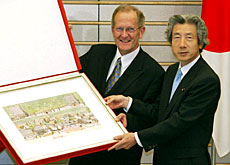Swiss use Expo to update image in Japan

Switzerland will use the 2005 World Expo to revamp its image in Japan, according to a senior official at the Swiss pavilion in Aichi.
In an interview with swissinfo, Philippe Neeser also warns that his country cannot afford to take economic ties with the Japanese for granted.
A lawyer by trade, Neeser has lived in Japan for more than three decades.
He has held several key positions at Swiss specialty chemicals firm, Ciba, and spent three years as president of the Swiss Chamber of Commerce and Industry in Japan.
From 1986 to 2001 he served on the Council of the Swiss Abroad, which represents the interests of more than 600,000 Swiss living overseas.
Last year Neeser was appointed Deputy Commissioner-General of the Swiss pavilion at the World Expo.
He will represent Switzerland at key events during the six-month run of the global exhibition, which got underway in the Japanese prefecture of Aichi on Friday.
swissinfo: Switzerland wants to use Expo 2005 to revamp its image in Japan. What’s the problem?
Philippe Neeser: Well, on the surface of it, there’s no problem. Switzerland benefits from an excellent reputation in Japan and the two countries can look back on more than 140 years of diplomatic and economic ties.
But we do need to brush the dust away from the traditional image the Japanese have of Switzerland. We are going to use the Swiss pavilion to show that the country is about far more than the Alps, Heidi, chocolate, watches and tourism. We want people to know that we have very active and dynamic industries, that we are keeping abreast of progress in science and technology and that we are able to compete with Japan.
swissinfo: But the two countries don’t seem to be competing when it comes to economic reform. Is it fair to say that both Switzerland and Japan have for a long time been simply too rich to reform?
P.N.: Yes, I think that’s probably fair. The Swiss and Japanese are also traditionally very conservative and both nations share a general reluctance to embrace change. And they face similar issues, such as what to do about the greying population and low birth rate.
But it’s a bit more complex than that. If you turn the clock back 60 years, Switzerland came out of the Second World War intact, whereas Japan was reduced to ashes. So the Swiss had a far easier time than the Japanese, who had to rebuild their country – which they did with great courage and tenacity.
swissinfo: Does the difference in size between Switzerland and Japan have an impact on the desire to reform?
P.N.: Absolutely. Just look at the figures: Switzerland has a domestic market of a mere seven million people. Japan has a huge market of 130 million. So it’s easier for the Japanese to turn around and say that – if push came to shove – they could live from their domestic market.
The need to export is far more urgent in Switzerland, and so it follows that the urgency to reform and adapt is perhaps stronger than it is in Japan. Mind you, some of my compatriots back in Switzerland do not seem to have cottoned on to this, which would make them close to the Japanese in the way they tend to react to change.
swissinfo: How do you see economic ties developing over the next few years?
P.N.: Swiss companies looking for new products and technologies, and those which are prepared to make the necessary investment and commit themselves to Japan, will be successful. Some of them may even become major players on the Japanese market.
The problem is that Swiss firms often take Japan for granted. They think that China is more sexy and promising, so their eyes are more often turned to that country. I think they’re making a big mistake.
Of course China has potential and needs a lot of attention. But we ignore the Japanese market at our peril. Japan remains a world leader in cutting-edge technology. So if Switzerland wants to continue to be a leading player in those markets where we are successful today, we must watch what the Japanese are doing and compete with them on their own territory.
swissinfo: Because Switzerland needs Japan more than Japan needs Switzerland?
P.N.: That’s certainly the case. I know the Swiss government is keen to enter into a free-trade agreement with Japan. But Japan is higher on Switzerland’s priority list than Switzerland is on Japan’s. This is completely understandable, but we tend to forget in Switzerland that we are only a small market. We are important, but definitely not a major world player.
swissinfo: Is it a help or hindrance to the Japanese that Switzerland lies outside the European Union?
P.N.: That’s difficult to answer. It’s often seen by the Japanese as a drawback, but it depends on which industry or sector you are talking about. Bankers may have a very different view to the one held by car manufacturers or chemical producers.
My own belief is that Switzerland has to integrate into the EU. It simply cannot remain isolated and it would be a great shame if the country ends up as no more than a museum piece accumulating dust in the centre of Europe.
swissinfo-interview: Ramsey Zarifeh in Aichi, Japan
Japan is Switzerland’s most important trading partner in Asia.
In 2003 exports from Switzerland to Japan totalled SFr5.14 billion ($4.06 billion), while imports from Japan were worth SFr2.64 billion.
The most important Swiss export products to Japan are machinery, technical instruments, chemicals and pharmaceuticals, and consumer goods.
Imports from Japan consist mainly of cars, electronic goods, machinery and chemical products.
Born in 1947, Philippe Neeser studied law at Geneva University and later took a doctorate from Kyoto University.
He moved to Japan more than three decades ago and has held several key posts at Ciba Specialty Chemicals (formerly Ciba-Geigy).
In 2004 he was appointed Deputy Commissioner-General of the Swiss pavilion at the World Expo in Japan.

In compliance with the JTI standards
More: SWI swissinfo.ch certified by the Journalism Trust Initiative










You can find an overview of ongoing debates with our journalists here . Please join us!
If you want to start a conversation about a topic raised in this article or want to report factual errors, email us at english@swissinfo.ch.